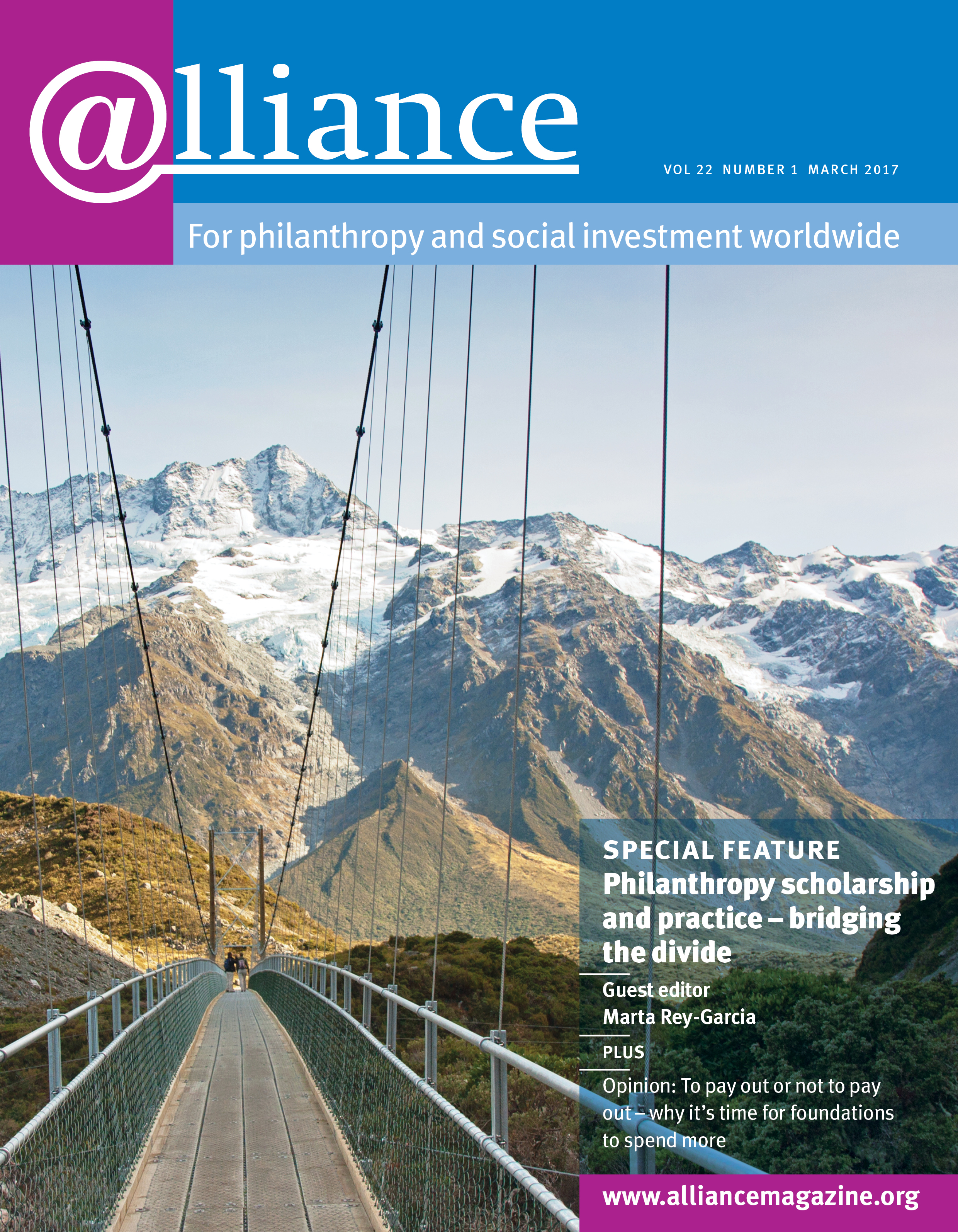Philanthropy is now achieving global academic visibility. The world’s first school of philanthropy opened in the US in 2013 and new philanthropy centres and chairs have emerged in recent years in Africa, India and Europe. Such interest is likely to intensify as philanthropists assume growing influence over public policy and practice. Yet the study of philanthropy remains relatively small compared to scholarship and teaching on politics, government and business. To date, there is limited awareness of why it might be important to study philanthropy, what we need to know about philanthropy and how much priority should be given to informing policy and practice.
This edition of Alliance seeks to offer readers an introduction to these questions and to open a bridge between academics and practitioners. We begin with an outline of current provision. This survey, while not definitive, documents the remarkable growth in philanthropy studies in the last five years and highlights the range of disciplines, topics and levels in which the academic world engages philanthropy.
A series of articles highlight why scholarship on philanthropy is important and what it can offer. Paul Ramsbottom and Patricia Rosenfield describe the largely untapped potential of history and historical archives to foundation practitioners, while René Bekkers emphasizes the need for and uses of reliable giving data.
We also look at the remarkable growth in teaching about philanthropy. Here we offer viewpoints from student-led courses on effective altruism and experiential philanthropy to executive education for existing foundation professionals.
We then go on to consider what practitioners say they need from academia, especially in regions and countries in which institutional philanthropy is emerging. We hear from Bheki Moyo about plans for Africa’s first chair in philanthropy, as well as from pioneering figures in India, Chile, Mexico and Canada. These perspectives show how academic interest in philanthropy is developing in response to the particular context that each country or region faces.
As academic interest in philanthropy heats up worldwide, we also seek to draw out some of the challenges and difficult issues along the way: from balancing academic rigour and practitioner relevance to the spectre of conflicts of interest as philanthropy essentially funds research into itself.
Finally, this edition continues the controversial debate on whether foundations should be compelled to make mandatory payouts. In our last issue Cathy Pharaoh argued that mandatory payouts make little sense and lead to the worst of both worlds – no long-term increase in resources and a reduction in the freedom of foundations to decide on their own spending levels. Jake Hayman and Angela Kail continue the debate on these pages and we invite you to join them by contributing your views.
Charles Keidan
Editor, Alliance






Comments (1)
Couldn’t access all of the links blocked subscription provided but think there was enough to formulate a arguement against all three debates. The barrier to entry for others to create foundations for goodwill that brings more exposure of brands, groups will be raised with minimum payouts or regulatory cost which excludes other from receiving social credit of established value to return of investment in target areas that build loyalty needed to compete. The ability for foundations to provide PR through corporate responsibility and withhold at whim against government policies at protest while not participating in wage growth to employees that hinders their ability to live without governmet or charity is the product of exploiting powerful positions for control over means. This should be positioned at the beginning of any concern of giving that provides incentive of growth above earning abilities to sustain wealth not provide less abilities to access the earning potential to fight over which institution is better capable or more rewarding to gain loyalty or credibility. The case of who has more to give that isn’t or who is giving the most provides corruption to generate more wealth without paying for value created to retain position of attacking those that could also use wealth in generate loyal charity cases to defend brands worth to others. The minimum giving against tax credits or liabilities created with giving should only be weighed after giving back is accounted for in devaluation of self worth and owed for lack of upholding invested interest corrupted by political posturing for future attacks in using plight and decline as promise to resolve on backs of being disposed by failed states.